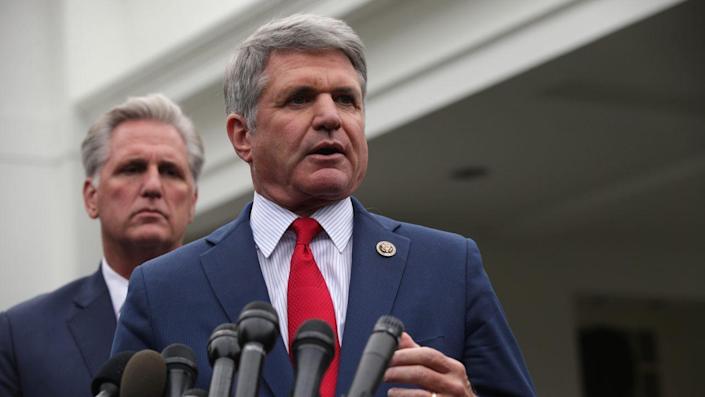House Republicans are pressing to ensure Congress gets to vote on a new Iran nuclear deal — and expect to get help from Democrats who have also raised serious concerns about rejoining the 2015 agreement.
The top Republican on the House Foreign Affairs Committee, Rep. Michael McCaul, said Wednesday he’s launching a discharge petition in the House to ensure the Biden administration complies with the 2015 Iran Nuclear Agreement Review Act that requires congressional review and a vote.
“We’re drafting a discharge petition to mandate that the administration comply with the law,” McCaul, R-Texas, said Wednesday at a press conference with many other Republicans opposed to rejoining the Iran nuclear agreement.
DEMOCRATS BAND TOGETHER TO RAISE CONCERNS WITH IRAN NUKE DEAL REVIVAL: ‘WE CAN’T STAY QUIET’
Noting Democratic opposition to the proposed deal, McCaul suspects that the Biden administration will avoid bringing anything before Congress and suggested the White House has some “some pretty darn good lawyers” that will “try to get around the law.”
If McCaul can get the majority of the House to sign on (218 members) he could force floor action on the measure. Republicans currently have 209 seats in the House and would only need a handful of Democrats to join him.
Earlier Wednesday, 18 House Democrats joined together to raise serious concerns about a potential new deal and the need for Congress to have an opportunity to vote on it.
“I’m doing a whip count. I’m seeing a lot of Democrats that are with us,” McCaul said. “All we need is 218.”
McCaul said if the Biden administration enters the deal, Republicans can use a similar mechanism to bring a resolution of disapproval to the House floor too. And if the GOP retakes Congress in this year’s midterm elections, McCaul previewed that Republicans will seek to undermine the deal.
“When we get the majority back, I can assure you that will be coming,” McCaul said of a joint resolution of disapproval.
Negotiations have been ongoing in Vienna for the U.S. to rejoin the Joint Comprehensive Plan of Action (JCPOA) that President Trump pulled out of in 2018. Britain, France, Germany, Russia and China are still part of the deal with Iran and have been trying to salvage it. There have been reports for the last month that negotiators are close to an agreement, which has created a sense of urgency among lawmakers to speak out.
“We understand that while the recent negotiations have not concluded, we feel that we can’t stay quiet about the unacceptable and deeply troubling turn that these talks have reportedly taken,” Rep. Elaine Luria, D-Va., said at a news conference Wednesday with fellow Democrats concerned about the deal.
White House press secretary Jen Psaki was asked at a news conference on March 17 whether President Biden believes he needs to follow the Iran Nuclear Agreement Review Act and whether Congress needs to take a vote.
Psaki said that if and when there is a deal, “we would carefully consider the facts and circumstances of any U.S. return to the JCPOA to determine the legal implications, including those under the Iran Nuclear Review Act of 2015. And we’re committed to ensuring the requirements are satisfied. So, certainly, we would abide by that.”
At Wednesday’s news conferences McCaul was flanked by other Republicans on the Foreign Affairs Committee. They described a potential new Iran deal as “dangerous,” “insane” and “suicidal.” They stood before a sign that read: “Congress will not stand for a weak deal with Iran.”




